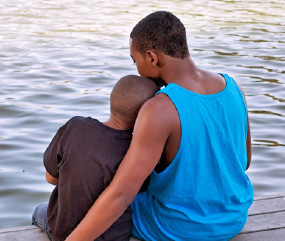About the Study (FAQ)
Who is conducting the study and why?
The National Military Family Bereavement Study is the first large scientific study of the impact of a U.S. service member death on surviving family members. The research is being conducted by Uniformed Services University of the Health Sciences (USUHS) Center for the Study of Traumatic Stress (CSTS) in Bethesda, Maryland. The multi-disciplinary research team is led by Stephen J. Cozza, M.D., Associate Director of CSTS/Director of the Child and Family Program.
The death of a family member is a life-changing event for the entire family. Although bereavement eventually occurs in every family, not all bereaved persons grieve in the same way. Surviving members of military families may offer a unique perspective to understanding grief. From the initial distress of notification to longer-term challenges, family members face difficult emotional and practical issues possibly related to distinctive characteristics of military death. However, families impacted by a U.S. military death may also possess unique protective factors that affect their bereavement process and experience of loss.
There is a lack of substantive research on the impact of the death of a family member serving in the U.S. military. The need to study individual and family bereavement when a U.S. military service member dies is critical to understanding the experience of grief and loss in this unique survivor population.
This study’s findings will help to provide a scientific basis to inform policies effecting survivor care. This study seeks to better understand the impact of a service member’s death on his or her family of origin and family of procreation. The study investigates the impact of community support and services on the bereaved and how available resources impact resilience or vulnerability in surviving families. Finally, this study builds on the growing evidence addressing the intersection of grief and trauma and its effects on military family member's bereavement process.
Who are the study partners?
The study team continues to collaborate with experts at universities and organizations across the country. Our collaborators provide a wide range of support to the study by contributing guidance in study design, questionnaire development, community engagement, survivor support services, and survivor outreach. For a full list of our community sponsors, please visit the “Partners of the Study” section on the homepage.




















